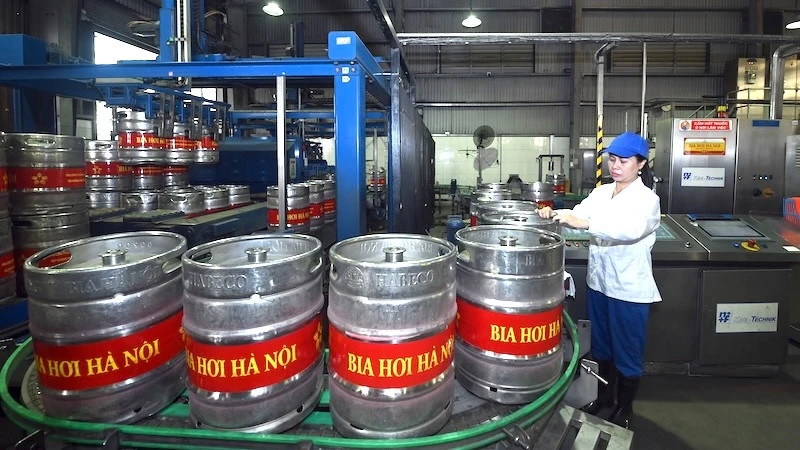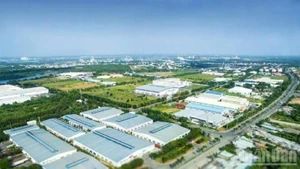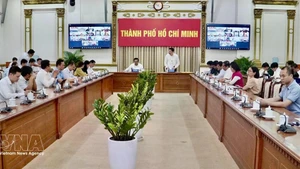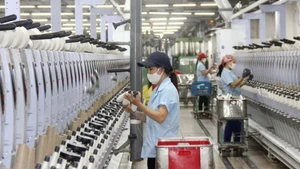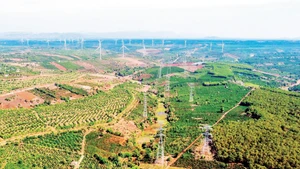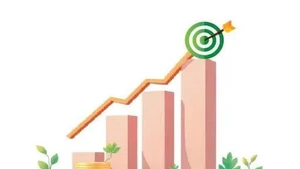The beer industry has a very important position and role in generating revenue for the budget through direct taxes from beer production and other amounts through related activities such as retail distribution services, including import and export services.
In recent years, the beverage industry, including the beer industry, has contributed greatly to the state budget, with an average of more than 60 trillion VND per year. The production value of the beverage industry accounts for about 5.6–6% of the total industrial production value, while it creates jobs for tens of thousands of direct workers and millions of indirect workers in the beer supply chain.
On the other hand, the beer industry also attracts large foreign investment capital from multinational companies from developed countries in Europe and America, bringing modern production and processing technology, contributing to the beer industry industrialisation and modernisation, and advanced production management and business methods, thereby helping to improve the Vietnamese beer industry’s competitiveness in the domestic and international markets in the context of integration.
Assoc. Prof. Dr. Nguyen Van Viet, Chairman of the Viet Nam Beer-Alcohol-Beverage Association (VBA), said that the beer industry maintained a good growth momentum in the 2009–2015 period with an average annual rate of nearly 10%. However, since 2016, when the special consumption tax rate on this item began to be adjusted to increase by 5% per year, the average annual growth rate of the beer industry in the period of 2016–2019 has decreased to about 6.85%.
The beer industry continued to be strongly affected by the Covid-19 pandemic as well as a number of related policy mechanisms, such as the law on prevention and control of harmful effects of alcoholic beverages, Decree 100/2019/ND-CP. Therefore, the average growth rate of the industry in the period of 2016–2024 has decreased to only 3.3% per year, lower than the GDP growth rate in the same period.
The draft Law on Special Consumption Tax (amended) is expected to be considered and approved by the National Assembly at the 9th Session of the 15th National Assembly, in which it is proposed to add more taxable items and increase tax rates on beer and alcohol. In the context of our country's economy continues to face many difficulties and challenges and is affected by the intertwined impacts of economic and political fluctuations in the world, especially the US reciprocal tax policy.
Domestically, businesses are still facing many difficulties that have lasted since the Covid-19 pandemic, such as the number of newly registered businesses in the first quarter of this year decreased while the number of businesses suspending business or completing dissolution procedures increased. Therefore, experts assess that changing the tax calculation method at the present time will greatly impact the production and business activities of the beer and alcohol industry, which has been facing many difficulties.
Dr. Le Duy Binh, Director of Economica Viet Nam, said that Viet Nam's economy still faces many challenges, while the world economy is very difficult with the fragile recovery of many major economies. Domestically, aggregate consumer demand is recovering slowly and production and business in some industries and fields are still facing difficulties.
In particular, in early April, the administration of US President Donald Trump suddenly announced a reciprocal tax policy applied to all trading partners, which was a big shock to Viet Nam's export-oriented economy.
This tax has made FDI enterprises and domestic private enterprises extremely worried. It threatens to affect enterprises’ growth targets, even their own survival. It could impact employment and social security for hundreds of thousands, even millions, of workers in the sectors most heavily affected by the new tariffs.
For now, the tax imposition has been postponed. Management agencies, businesses and employees may find temporary relief with the implementation of the tax having been delayed by an additional 90 days.
In that context, the Law on Special Consumption Tax (amended) expected to be soon passed by the National Assembly will create a “double impact” on a number of manufacturing industries, especially the beer industry. The law will have major, direct impacts on production and business operations, the livelihoods of millions of workers in both the industry and related sectors, millions of consumers, and the economy.
With the political determination of the growth target of 8% or more this year, as well as the spirit of businesses support in Resolution No. 68-NQ/TW, the tax increase seems “out of sync” in this context.
The responsible use of beer and alcohol is a civilised practice that we should pursue. High taxes will be just one of measures to form that civilised practice. However, high, unexpected, and unforeseeable taxes can actually dampen businesses’ efforts, attempts, and investments to create quality products to serve that civilised practice.
Notably, in the context of the entire economy, businesses, and people striving towards the target of high growth in the coming years, the investment decline in the beer and alcohol industry and the decline in people's consumption of standard alcohol products will affect total demand and directly affect the GDP growth target this year. Right now, businesses have begun to hesitate before deciding to invest in new projects or expand production when facing an urgent and strong tax increase roadmap.
Forming a civilised practice is a good thing to do, but it is impossible to use only one measure of tax, and the special consumption tax adjustment with a hasty roadmap may affect the prioritised policy goals in this period. That is GDP growth, supporting businesses to overcome difficulties caused by the global tariff shock to continue to develop and make stronger breakthroughs in the coming time.
"A reasonable tax increase roadmap both in terms of tax rate and application time will help harmonise the objectives of the special consumption tax while also ‘easing the burden’ on businesses, supporting their recovery, and continued contributions to high-speed economic growth this year and in the years ahead,” Dr. Le Duy Binh emphasised.
From another perspective, tax expert Nguyen Van Phung said that Viet Nam’s domestic consumption includes consumption by domestic people and by international tourists. In theory, direct taxes (such as income tax) will reduce resources for consumption, while indirect taxes will have the effect of prices increasing and demand reduction.
The issue of concern is how to encourage consumer spending increase, and what role suppliers and vendors can play in stimulating consumption and what tax solutions should be applied to accompany consumers.
In recent years, the tax, fee and charge policy system has been completed, directly or indirectly impacting on stimulating domestic consumption, for both domestic consumers and tourists through contributing to creating a favourable and transparent investment and business environment, encouraging production and business development, creating jobs, and increasing people’s income.
The rearrangement of fees and charges of the entire economy, especially those related to culture, tourism, immigration, transportation, and accommodation along with specialised management measures, has significantly contributed to attracting tourists to Viet Nam.
The regulations and implementation of duty-free shopping and VAT refunds for departing tourists, although only implemented for a few years, have already proven effective in drawing more tourists and encouraging higher spending. Corporate income tax incentives, such as tax exemptions or reductions for enterprises operating in disadvantaged or especially difficult areas, have also played a role in promoting the development of new tourism facilities.
From a consumer perspective, spending increasing or reducing are directly influenced by disposable income and the price of goods and services. Rising incomes enable increased consumption, while reasonable prices help maintain regular spending. Consumers are more likely to spend when offered discounts, and after-sales service. Conversely, rising living costs will lead to social consumption decrease.
Therefore, to stimulate domestic consumption, nurture revenue sources and support the market to prioritise rapid and sustainable economic growth, Nguyen Van Phung recommends that it is necessary to continue reducing VAT from 10% to 8% for a longer period, at least until the end of 2026 while expanding the application to all goods and services (including items subject to special consumption tax) to ensure fairness, science, and conformity with the VAT's continuous deduction mechanism, avoiding "tax transfer, tax increase" for items subject to a tax rate of 10%.
In addition, the current tax law should be comprehensively revised, especially regarding the 10 categories of taxable income and the 16 types of tax-exempt income. The revision should focus on broadening the tax base while narrowing exemptions. In particular, income from wages needs to have the family deduction level and the gap between income levels in the progressive tax schedule amended.
As for the Draft Law on Special Consumption Tax (amended), it is necessary to acknowledge and carefully consider the following factors, including the beverage sector’s current difficulties as weak demand and an incomplete market recovery; and consumer habits changing, with people drinking less and avoiding public venues such as bars and restaurants, largely due to stricter traffic safety regulations.
For these reasons, Phung expressed his support for the Viet Nam Beer–Alcohol–Beverage Association (VBA)’s proposal to postpone the implementation of the Law on Special Consumption Tax (amended) until 2028, followed by an annual increase of 5%.
